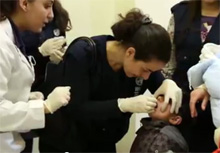 Officials fear that the risks of under-immunization are not clearly understood by the publicBeirut, 10 April 2014 – As the threat of polio grows across the Eastern Mediterranean Region, the Ministry of Public Health of Lebanon today launched a national polio immunization campaign to prevent polio regaining a foothold in Lebanon after an absence of 13 years.
Officials fear that the risks of under-immunization are not clearly understood by the publicBeirut, 10 April 2014 – As the threat of polio grows across the Eastern Mediterranean Region, the Ministry of Public Health of Lebanon today launched a national polio immunization campaign to prevent polio regaining a foothold in Lebanon after an absence of 13 years.
This campaign is part of a multi-country regional drive to contain the spread of the highly infectious and incurable virus. The campaign aims to immunize at least 600 000 children under-5 in Lebanon against polio over the coming six days. Vaccinators will also protect all children under 18 against measles and rubella and deliver vitamin A to strengthen children's immune systems.
“Lebanon has been polio-free for more than a decade and we are committed to preserving that status,” said His Excellency Wael Abu Faour, the Minister of Public Health. “We know that only multiple doses of oral polio vaccine can provide enough protection. Over the next few days the nation must make it a priority to ensure these vital vaccines reach all children within these borders.”
“This is an important moment for children’s health in Lebanon,” said Annamaria Laurini, UNICEF Representative in Lebanon. “We are appealing to every parent and doctor: make sure children receive the polio vaccine during these rounds no matter what their immunization status. Any case of polio here would be an avoidable tragedy - for the family and for the country.”
“One or two doses of the oral or injectable vaccine is simply not sufficient now that polio is spreading in the Region,” said Dr Hassan El Bushra, WHO Representative in Lebanon. “Children need the strong immunity delivered by the oral polio drops and they need multiple doses. Our message to families and their doctors is clear: every child must participate in every round to prevent lifelong paralysis and to keep Lebanon polio-free.”
UNICEF is providing 1.7 million doses of polio oral vaccine of and 1.3 million measles and rubella vaccines for the campaign. WHO has supported campaign planning and the training of nearly 4200 vaccinators.
While the campaign lasts, children can receive the vaccines for free at primary health centres, public and private schools and from their private doctors. Vaccinators will also be travelling door-to-door in areas deemed to be at particularly high risk: Akkar, Minieh-Danieh, Tripoli, Hermel, Baalbeck, Zahle, West Bekaa, Rachaiya, Bint Jubail, Sour, Marjaayoun, Ikleem Karoub in Chouf and part of Beirut. In addition, mobile teams supported by UNICEF will visit 1185 informal settlements nationwide to vaccinate Syrian refugees living there.
This campaign follows a similar drive in March. However, officials fear that participation may be dropping, in part because the risks of under-immunization are not clearly understood.
For more information, please contact:
Ministry of Public Health on 01 611174-5
Ministry of Public Health, Randa Hamade, Head of Primary Health Directorate on 03 538878
UNICEF: Soha Boustani on +961 3 236 167
UNICEF: Salam Abdulmunem on +961 7 996 605
WHO: Ramzieh Sabah on +961 70 015 910








